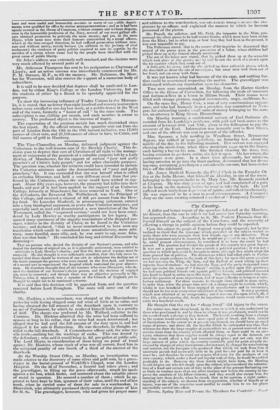The Vice-Chancellor, on Monday, delivered judgment:against the Unitarians, in the
well-known case of the Hewley Charity. This de- cision goes to deprive that sect of Christians of all right to the manage- meat or enjoyment of the proceeds of a valuable property left by a Lady Hewley, of Manchester, for the support of certain "poor and godly preacher's of Christ's holy gospel," and for other charitable purposes. The question was, whether the testatrix could have intended to include the Unitarian ministers under the denomination of "poor and godly preachers," &c. It was contended that she was herself what is called an orthodox Dissenter, and held a very different creed from that pro- fessed by the Unitarians, whom she never could have wished to sup- port. About fifty years ago, however, the property had fallen into their bands, and part of it had been applied to the support of an Unitarian College, formerly at Manchester, but since removed to York. One of the defendants, the Reverend Mr. ‘Vellbeloved, was the Principal of this College, and received a stipend of SOL per annum from the Hew- ley fund. Sir Lancelot Shadwell, in pronouncing judgment, entered into a long theological argument, to prove that Unitarian ministers, and especially such as used and disseminated a new translation of the New Testament, called the "improved version," could not have been consi- dered by Lady Hewley as worthy participators in her legacy. He quoted many specimens of the singular translations of the disputed pas- sages, relative to the divinity of Christ, to be found in the Unitarian version ; and declared, "that he never remembered to have seen any translation which could be considered more unsatisfactory, more arbi- trary, more fanciful, more silly, and, he was sorry to say, more false, than was that book." He concluded his long and critical discussion by decreeing— That no persons who denied the divinity of our Saviour's person, and who denied the doctrine of original sin, as it is generally understood, were entitled to articipate in Lady Hewley's charity, and that the first set of trustees must be removed. He also thought it was sufficiently manifest, that this lady never in- tended that there should be trustees of one sort to administer the dealing out of the feuds amongst the persons who were named in the first deed, and trustees of a second sort to superintend the hospital which contained the poor almswo- men. He therefore thought that all the trustees who were Dissenters, who de- Medi the doctrine of our Saviour's divine person, and the doctrine of original sin, must be removed ; and though there was no objection personally to Mr. Palmer, who, it appeared, was a member of the Church of England, yet he thought he ought not to be continued a trustee.
It is said that this decision will be appealed from, and the question reargued before Lord Brougham. The costs will come out of the charity.
















 Previous page
Previous page